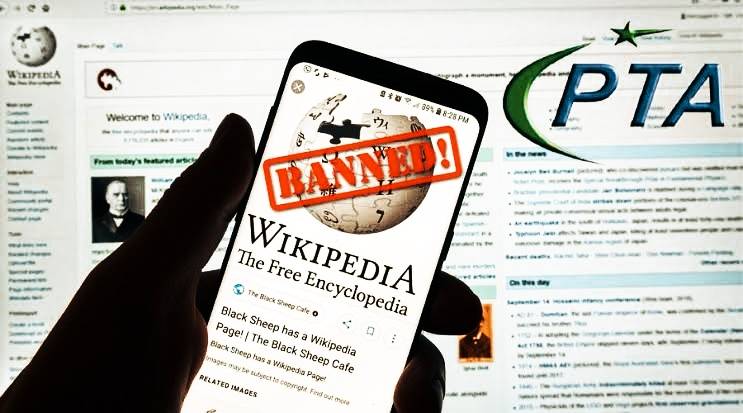
Prime Minister Shehbaz Sharif has ordered the immediate restoration of online encyclopedia Wikipedia, banned by the Pakistan Telecommunication Authority last week for not “blocking/removing sacrilegious content.”
The telecom authority had banned the site Wikipedia for its failure to remove the said content within the 48-hour deadline issued for the purpose.
Before placing the ban, PTA had 'degraded' the encyclopedia's services as the content persisted on the site.
Making the announcement, Information Minister Marriyum Aurangzeb said that Wikipedia was restored in Pakistan. She added that the premier had also formed a Cabinet committee regarding the website and other online content.
Earlier, according to a statement published by the Wikimedia Foundation, the parent organisation of Wikipedia, the PTA issued a notification to them that said that their services in the country had been “degraded for 48 hours” due to “failure to remove content deemed unlawful.”
Latest data available with Wikimedia showed that PTA imposed a “full block” on Wikipedia in Pakistan.
In response to the action, Wikimedia Foundation had called on Pakistani authorities to restore access to the banned site.
“We believe that access to knowledge is a human right. A block of Wikipedia in Pakistan denies the 5th most populous nation in the world access to the largest free knowledge repository,” it had said.
The ban caused uproar and condemnation, as many wondered how the financially stressed and deeply polarised country can hope to develop an educated and globally integrated society when it continues to disengage with international technological platforms.
Netizens decried the state institutions’ move resulting in depriving the general public from access to information. The over-extended state of the authority's apparatus and its cost to the nation, is also a cause for many.
Some even called for PTA to ban internet altogether, if the actual goal was to control information flow, rather than regulate and improve telecommunications for the interest and benefit of the masses and not just the entrenched elite. Wikipedia was restored in Pakistan only after outcry on social media.
This is not the first time a major global information disseminating platform was banned in Pakistan. Previously, Youtube, Tiktok, and Facebook were blocked on multiple occasions, with the notion of blocking websites critical of the country’s powerful establishment.
Naya Daur has been a victim of this censorship policy twice in the past. First in April 2018, and later, in January 2020, right after General (retd) Bajwa’s extension in term.
https://twitter.com/Marriyum_A/status/1622627905829490688
The telecom authority had banned the site Wikipedia for its failure to remove the said content within the 48-hour deadline issued for the purpose.
Before placing the ban, PTA had 'degraded' the encyclopedia's services as the content persisted on the site.
Making the announcement, Information Minister Marriyum Aurangzeb said that Wikipedia was restored in Pakistan. She added that the premier had also formed a Cabinet committee regarding the website and other online content.
Earlier, according to a statement published by the Wikimedia Foundation, the parent organisation of Wikipedia, the PTA issued a notification to them that said that their services in the country had been “degraded for 48 hours” due to “failure to remove content deemed unlawful.”
Latest data available with Wikimedia showed that PTA imposed a “full block” on Wikipedia in Pakistan.
This is not the first time a major global information disseminating platform was banned in Pakistan. Previously, Youtube, Tiktok, and Facebook were blocked on multiple occasions, with the notion of blocking websites critical of the powers that be.
In response to the action, Wikimedia Foundation had called on Pakistani authorities to restore access to the banned site.
“We believe that access to knowledge is a human right. A block of Wikipedia in Pakistan denies the 5th most populous nation in the world access to the largest free knowledge repository,” it had said.
The ban caused uproar and condemnation, as many wondered how the financially stressed and deeply polarised country can hope to develop an educated and globally integrated society when it continues to disengage with international technological platforms.
Netizens decried the state institutions’ move resulting in depriving the general public from access to information. The over-extended state of the authority's apparatus and its cost to the nation, is also a cause for many.
Some even called for PTA to ban internet altogether, if the actual goal was to control information flow, rather than regulate and improve telecommunications for the interest and benefit of the masses and not just the entrenched elite. Wikipedia was restored in Pakistan only after outcry on social media.
This is not the first time a major global information disseminating platform was banned in Pakistan. Previously, Youtube, Tiktok, and Facebook were blocked on multiple occasions, with the notion of blocking websites critical of the country’s powerful establishment.
Naya Daur has been a victim of this censorship policy twice in the past. First in April 2018, and later, in January 2020, right after General (retd) Bajwa’s extension in term.
https://twitter.com/Marriyum_A/status/1622627905829490688

